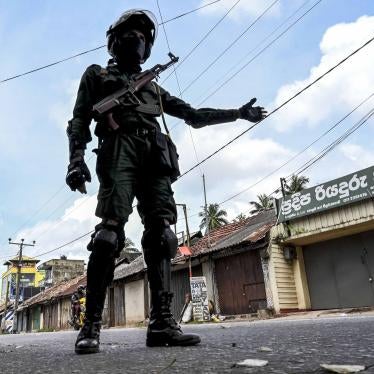(New York) - The Pakistani government should protect civilians from attacks by the Taliban and other groups in the volatile tribal areas on Pakistan’s border with Afghanistan, Human Rights Watch said today.
“Taliban attacks on civilians in the tribal areas have soared since the Pakistani forces pulled out, and the government can’t just turn a blind eye to the violence,” said Ali Dayan Hasan, South Asia researcher for Human Rights Watch. The killing of a senior health official and the beheading of an Afghan refugee accused of being a US spy by alleged Taliban supporters in the past week were the latest in a series of attacks that underscore the deteriorating human rights situation across the tribal areas.
In September 2006, Pakistan’s government signed agreements ending military operations in the Federally Administered Tribal Areas and effectively ceded power to local tribal leaders closely allied with the Taliban in the border region of Waziristan. In exchange, tribal leaders made a commitment to close down Taliban and al-Qaeda operations in the area. The deal, initially supported by the United States, has now been branded a failure by US officials as militant activity in the region and cross-border attacks in Afghanistan have increased.
Under pressure from the United States, the Pakistani military had been targeting suspected al-Qaeda training camps and Taliban groups in the tribal belt in operations since March 2004.
“The Pakistani government can’t simply refuse to take responsibility for the governance and safety of people in the tribal areas,” said Hasan. “Pakistan cannot look the other way as the population of the tribal areas becomes hostage to increasing violence and human rights abuses.”
Dr. Abdul Ghani Khan, a senior health official working on a polio immunization drive in the Bajaur tribal area, was killed there in a bomb blast on February 16. Government officials told the media that the attack was targeted and the attackers used a remote-controlled bomb. Some tribal elders allied with the Taliban have alleged that the vaccination campaign was a US conspiracy to cause infertility and reduce reproduction rates in the region. Khan was killed after returning from a meeting of tribal elders to persuade them to end their opposition to the campaign.
On February 20, the body of an Afghan refugee was found beheaded in Saidgi village in nearby North Waziristan agency with a note on his person declaring him a US spy. Villagers from Saidgi, near the border with Afghanistan, found the body in a stream beside a road. The victim was later identified as Nek Amal, a native of Zozak village in Afghanistan’s Khost province. The circumstances of the killing suggest that Taliban supporters were responsible.
Human Rights Watch said that the security of the residents of Pakistan’s tribal area has been seriously compromised in the aftermath of these peace agreements. Since September, there have been persistent reports that armed Taliban supporters in Pakistan’s tribal areas have engaged in vigilantism, “moral policing” and violent attacks on civilians, including murder and public beheadings. Increasingly it is being suggested that the Taliban effectively control large parts of the tribal areas.
Immediately after the signing of the peace deal, Pakistani and Afghan media reported the murder of at least three tribal leaders by pro-Taliban forces who accused them of spying for the United States. Since then, the Taliban have: attacked and killed Pakistani military personnel; beheaded scores of local residents, including tribal elders, accusing them of being US spies; prevented a polio vaccination drive alleging it to be a US plot; banned the shaving of beards; and levied and collected local “taxes.”
“The Pakistani government should arrest and prosecute the Taliban and militant leaders responsible for these murderous attacks,” said Hasan. “But it can’t because it has effectively allowed the Taliban and its allies to control the area and has given them free rein to commit abuses.”
Human Rights Watch also called upon the Taliban, tribal leaders and their supporters to respect the basic rights of the people in the tribal areas. Human Rights Watch criticized these groups for killing civilians, attacks on the rights of women and erecting barriers to accessing health care and education.
The situation in the tribal areas has deteriorated significantly since an October 30 missile attack on a seminary in the town of Khar killed 82 people, including several children. At the time, a military spokesman stated that the dead were all militants and denied any civilians had been injured, alleging that the seminary was being used as a training camp for Taliban and al-Qaeda militants. Local residents said that only students were present in the seminary, and that the strike was carried out by fixed-wing US drones, which fired Hellfire missiles as local residents gathered to offer the dawn Fajr prayer.
Human Rights Watch has previously called on the Pakistani government to allow independent monitors into the area to investigate the attack. The government has blocked such investigations.






